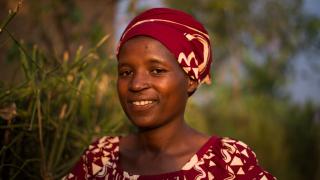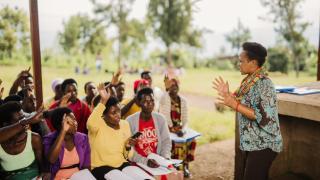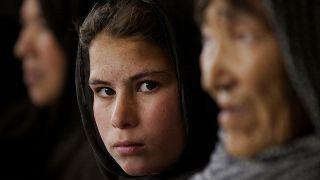International Day of Reflection on the Genocide in Rwanda
This April marks 25 years since the genocide in Rwanda claimed the lives of over 800,000 people in the tiny east African country. The fabric of Rwandan society was inexorably changed by this moment in history, which left in its wake a nation struggling to rebuild itself in the aftermath of such violence.
Despite the long road to recovery, Rwanda has in recent years transformed itself into one of Africa’s success stories, making great gains economically and socially. It is one of the top-performing countries in sub-Saharan Africa in education and is leading the way as the cleanest and greenest country in Africa, having banned the use of all non-biodegradable plastic bags and packaging materials. The international spotlight has been particularly focused on Rwanda’s representation of women in parliament, who hold a remarkable 68% of seats - the most in any country globally.
Women for Women International started to work in Rwanda in 1997, in the aftermath of the devastating events of 1994. Since then, we have served over 75,000 women through our year-long programme.
Today, a quarter of a century on from the genocide, we celebrate the rise of Rwanda from the ashes of conflict, and the elevation of women's voices. The challenge of creating a lasting peace depended greatly on the actions of women like Clemantine, who were the majority of survivors.

Meet Clemantine
Clemantine is a survivor of the genocide, who became separated from her family when they fled to escape from the killers. She survived by asking a neighbour to take her in and shelter her.
Clemantine joined the Women for Women International programme, and now runs her own business selling goats. She is proud to be paying her children's tuition fees and to be a decision-maker in her household. Watch Clemantine tell the powerful story of rebuilding her life after the genocide.
Continue Reading
Sylvia, our Fundraising Projects Assistant, was born during the civil war in Sierra Leone. She shares why peace matters whether you're in Sierra Leone or South London.
"Words like ‘empowerment,’ ‘equality,’ ‘feminism,’ can sound so big that sometimes it’s hard to gauge the first step in joining such a dynamic and quickly growing global movement." Women for Women International Ambassador, Tom Burke, provides his 5 tips for men on how to be better allies to women.
Since the Taliban’s return to power in Afghanistan in August 2021, Afghan women have experienced profound changes in their daily lives. The de facto government has reinstated many restrictions, severely limiting the rights and freedoms of women and girls.
Yet, in the face of these challenges, Afghan women have shown extraordinary determination and strength, finding ways to resist and adapt. Here, we explore five significant ways their lives have changed, highlighting both the difficulties they face and their ongoing fight for their rights.



